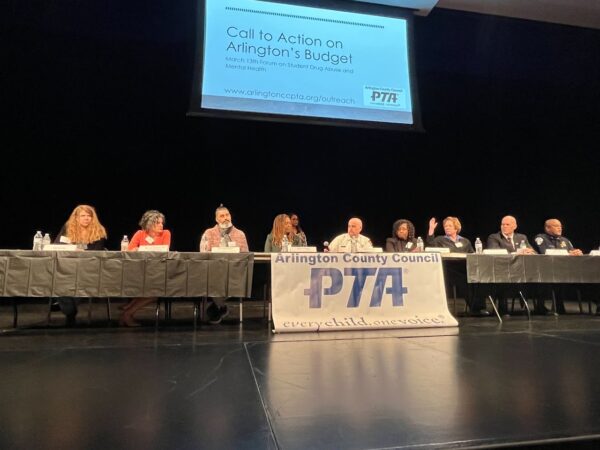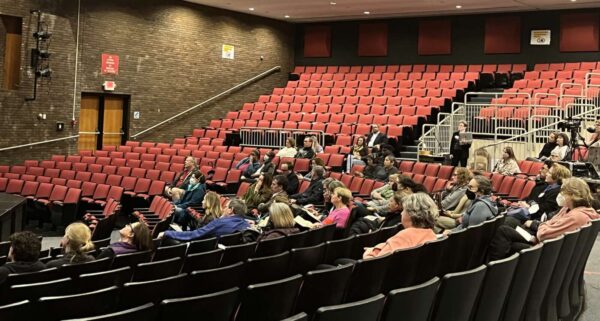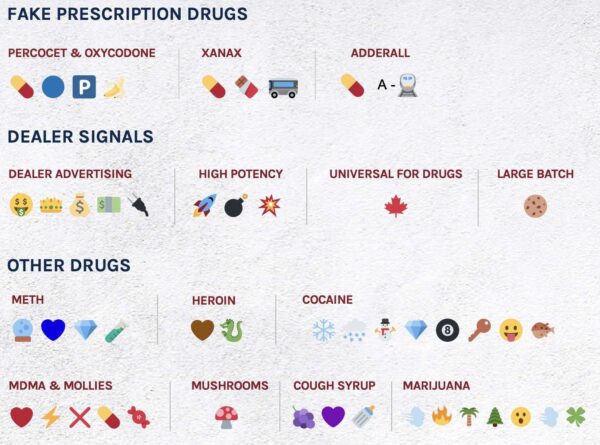
(Updated at 4:15 p.m.) As more parents and caregivers grapple with substance use addiction among youth, they are increasingly turning to the juvenile justice system as a last resort.
Over the past year, there has been upwards of a 100% increase in the number of petitions being made for court-ordered services, such as drug treatment, according to Hon. W. Michael Chick, Jr., a judge with the Arlington County Juvenile and Domestic Relations Court.
He noted “a dramatic increase” in Child in Need of Services or Supervision petitions, “CHINs” for short, filed by parents. These days, most are related to fentanyl.
“They are coming to the court to say, ‘We’re desperate, please save my child,'” he said in a video message to parents shared during a panel discussion on drugs last night (Monday) hosted by three high school Parent-Teacher Associations and the Arlington County Council of PTAs.
“They are children with severe substance addictions and they’re desperate,” said Chick.
“To have kids come in front of you, asking for a treatment program and you’re not able to provide it — to have a kid beg you to put them in detention to save them from themselves — it’s heartbreaking,” he continued, reinforcing reports that youth are effectively detoxing in the Northern Virginia Juvenile Detention Center in Alexandria.
There have been at least seven juvenile overdoses in Arlington County this year, including the death of 14-year-old student Sergio Flores after a fatal overdose at Wakefield High School. Following his death, teachers, parents and School Board members have called on Arlington Public Schools and all of county government to do more for children.
A slew of school– and community-sponsored panels have brought together first responders, counselors and addiction specialists and prosecutors to educate parents. The most recent was held last night at Thomas Jefferson Middle School, featuring a live panel discussion as well as pre-recorded messages, drawing some 200 virtual and in-person attendees.
An emerging theme at these meetings is the role of parents. The panel was as an outlet for a handful who shared first-hand observations as well as obstacles they face obtaining resources for their kids and getting through to them, with some panelists suggesting different ways parents can step up.

One mother shared how her daughter recently attempted suicide twice, part of a mini-rash of student deaths and attempted suicides this school year, and how long it took to schedule meetings with the right school officials to obtain accommodations to keep up with her schooling.
Michelle Best, who co-facilitates a parent support group through the local branch of the National Alliance on Mental Illness, empathized with how hard it can be for parents to receive services from the public schools in these situations.
“There’s a lot of information that could be better given to parents, out there in a better way,” she said.
A few panelists put the onus on parents, including Deputy Chief Wayne Vincent, the leader of the ACPD Community Engagement Division, who encouraged parents to tip the police to known drug dealers.
“I can’t tell you how many times, when I’m in our community, I hear, ‘Wayne, how do you not know who’s dealing? Everybody knows,'” he said. “Here’s a flash. No, not everybody knows. The police don’t know. There are so many ways you can help identifying who they are.”
One mother opined that the messaging at that meeting needs to be disseminated through TikTok to better reach kids. Dr. Sulman Mirza, who does just that, specializing in adolescent psychiatry and addiction treatment, suggested to that mother that she get on the platform, too.
Mirza makes humorous, educational TikTok videos about substance use, mental health and other topics under the profile @thekicksshrink.
“When I work with my teen patients, I’m ahead of them: I know what they’re watching and what they’re being exposed to, unless you’re in there, watching ‘Euphoria,’ listening to the rap songs, rock songs, everything that’s out there, you won’t know,” he said. (Euphoria is a gritty yet highly aesthetic HBO drama whose teen heroine has a drug addiction.)
A recent trend on TikTok involved lip-syncing to a 2020 song “Perc & Sex” by rapper YN Jay. Adults, teens and some young children can be seen doing the “perc dance” trend, dancing as if they have taken various doses of the opioid Percocet.

Kids also use a lexicon of emojis to signify drugs, as cataloged on the U.S. Drug Enforcement Agency website.
Other emojis not included in the DEA list include a bird for cocaine and a blue “M” for fake Percocets, also known as “blues” or by “M30s,” for a common dosage, we’re told.
Parents trying to keep their kids off drugs have to compete with that kind of cultural influence.
“We have to meet them where they are and market to them,” said Marcia Payne, a Senior Assistant Commonwealth’s Attorney for Prince William County. “If you listen to the music today — if you spend any time with your kids — listen to content of the songs. They’re rapping about Percocets.”
In her pre-recorded video, Payne noted that she, like Chick, is seeing more families willing to engage the process to get mandated treatment, typically for fentanyl, for their children.

In Arlington, Chick says Arlington needs more treatment programs for children once they’re in the court system, reiterating a reported lack of treatment options in Arlington for youth.
There are private treatment options out there, but people have to know where to look, said Mirza, adding that he has worked with many Arlington youth for everything from nicotine to fentanyl dependencies at the Inova Kellar Center, which has locations in Fairfax and Sterling, Virginia.
Debby Taylor, President and CEO of National Capital Treatment and Recovery, observed that Arlington used to have more treatment options for youth.
“When parents were really into this in the 80s, when the drug issue was hitting this area, we had 17 beds fill and a waiting list times three,” she said. “Ninety percent were North Arlington patients that came through and were involved in a 6-9 month program. It went from that to where we are today. It is possible to do it — we just have to figure out how.”
The center closed the youth treatment facility Phoenix House in 2015, citing insufficient insurance reimbursements, but it has reapplied to work with students.
In her concluding remarks, CCPTA President Claire Noakes urged parents to use the current school budget process to advocate for more literacy and life skills training in Arlington Public Schools, more classroom management support for teachers, plus trauma-informed practices and after-school programming — all aimed at keeping kids engaged in schools and less likely to do drugs.
“Don’t just ask questions. Just start. We’re trying to give you lots of ideas on where to start — there’re many more ideas,” she said.

